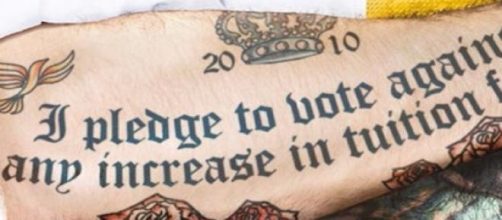The extent of the lack of trust students place in politicians has been articulated in a new nationwide advertising campaign launched by the National Union of Students in the run-up to the general election. The "Liar Liar" campaign emphasies the fact that hundreds of thousands of students feel utterly betrayed by the politicians who signed the "Voice for Students" pledge in 2010, which saw hundreds of candidates promise to vote against any attempt to increase tuition fees.
An extensive publicity blitz consisting of adverts in national newspapers, large advertising vans condemning those who broke the pledge, and huge billboards erected in London, Manchester and Sheffield will aim to shame the 31 MPs (of whom the vast majority were Liberal Democrats) who voted to increase fees in spite of their promise not to.
Polling undertaken by the NUS has shown that over three quarters of students do not trust politicians to keep their promises, while more than half of students believe that the government's tuition fee policy has been a failure.
NUS President Toni Pearce singled out the Liberal Democrat leader for harsh criticism, stating "I'd like to say directly to Nick Clegg that your apology won't cover any of the £40,000 debt that students will graduate with for the first time this summer." Pearce went on to stress that the NUS represents seven million students across the country and that they were urging all of them to take a stand and vote against broken promises on May 7.
The feeling of betrayal expressed by students towards the Lib Dems in particular was exemplified in a poll of over 2,000 students undertaken by the NUS; where Labour are at 25 per cent, followed by the Tories at 17 per cent, the Greens 15 per cent, UKIP 6 percent, while the beleaguered Lib Dems are at the bottom with just 4 per cent.
Nick Clegg however was not deemed to be the most untrustworthy party leader; that dishonour went to UKIP head Nigel Farage, who received more than half the votes in that polling category.
The most important issue for students voting in the election is the cost of living (75 per cent), followed by health, unemployment, the economy and tuition fees (all at 72 percent). The lowering of fees and a commitment to securing a living wage for everyone are the two most significant offers polled students would like to see presented from the next government (75 and 74 per cent respectively). 80 percent of students wish to see solid employment prospects, while 75 per cent want more politicians coming to visit university campuses, and 68 per cent desire a commitment from all parties to ensure that there is more representation for women and minorities at Westminster.

